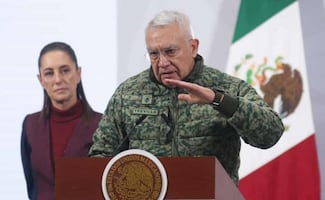Más Información

Identifican a célula de "Los Chapitos" como responsable de ataque armado a diputados de MC; legisladores son custodiados en hospital

Sheinbaum reacciona a orden de Trump sobre aranceles por envío de petróleo a Cuba; "podría desencadenar una crisis humanitaria"

Defensa anuncia cambios en mandos de alto nivel; Enrique Martínez López será el segundo del general Trevilla Trejo

Gobierno federal coordina búsqueda de 10 mineros desaparecidos en Sinaloa; no hay registro de amenazas previas, dice Harfuch

MC alista reforma a la FGR para "mejorar acceso a la justicia"; busca impulsar reducción de jornada laboral a 40 horas

Sheinbaum confía en presentar la reforma electoral la segunda semana de febrero; prevé integrar el tema de la IA
As this newspaper publishes today, the impact of the intervention of the armed forces in matters of public security as part of the fight against organized crime has reduced almost in key markers such as arrests of crime bosses and seizure of illegal drugs, weapons, and money.
This leads us to question the “strategy” implemented thus far against drug cartels as commandos have not only remained deployed across the national territory, there's also been an increase in their numbers when compared to the previous administration – and it seems the fight against criminal organizations is at a standstill, or even worse, experiencing a relapse.
And most certainly, a dwindling in arrests and illegal cargo seizures has had a direct impact on the increase in crime rates, especially in homicides and drug-related crimes. The above simply invalidates the claim that we need a greater involvement of the armed forces in matters of public security, a measure that will continue to encourage the ineffectiveness and impairment of local governments on matters of public security.
We have a security strategy that hasn't given us the desired results – and despite this, it has been kept throughout two administrations. The involvement of the armed forces is prioritized and more responsibilities are placed upon them, meanwhile, a bill was passed – the Law on Internal Security – to legalize their participation in matters of public security, matters that should be the responsibility of civil authorities. All in an effort to wage “war on drugs” despite the ineffective results obtained; and as a consequence, local governments have become irresponsible and powerless in the face of crime.
Given this situation, we fail to understand the stubbornness of adhering to a path that has more than proven its ineffectiveness. It's clear the army is overworked, consumed by jobs and tasks that are not part of their scope. The Federal Government already has a decade fighting organized crime and the problem persists with severe inconsistencies.
Like María Novoa from México Evalúa claims, “the reality is that despite the presence of the army in several states, there isn't an effective fight against crime and no considerable blows have been delivered to criminal organizations because we cannot delegate to the army the entirety of this process.”
am
Noticias según tus intereses
[Publicidad]
[Publicidad]








